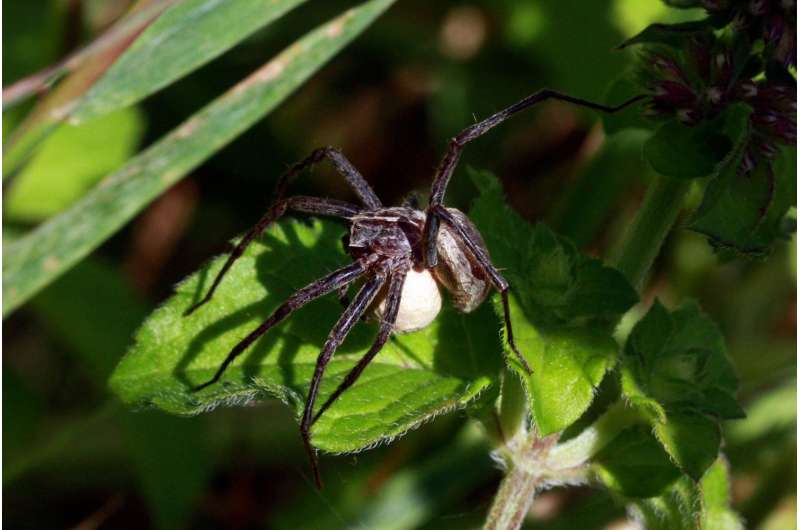May 19, 2016 report
Study shows nursery web spiders offer gift to potential mates to prevent being eaten

(Phys.org)—A pair of researchers at Aarhus University in Denmark has found evidence that suggests male nursery web spiders offer potential female mates silk covered insect carcasses as a means of protection from being eaten. In their paper published in the journal Biology Letters, Søren Toft and Maria Albo describe experiments they carried out to determine the true reason behind the males offering the females gifts prior to attempting to copulate and what they found by doing so.
Scientists have known for many years that male nursery spiders off up a gift to females prior to attempting to initiated copulation, but until now, the reason behind it has not been tested—possible theories suggested that it was meant as a means to woo the female, that it was meant to show a degree of parental investment, or more importantly, that it served as a possible shield against cannibalism.
To get to the correct motive, the team collected 280 pairs of the spiders and ran them through a variety of tests in their lab. Trials were run where males were caused to appear before a female with no gift under different circumstances, such as whether the female had been allowed to eat for a period of time. Identical trials were run where the male was allowed to procure a gift before being presented to the female.
In all, the researchers found that when the males showed up without a gift, they were eaten 15 percent of the time, compared to just 3.6 percent of the time for gift-bearing males, and it did not matter how hungry the female was. In actuality, the research pair report, only one male spider that showed up with a gift was eaten, and that was after the two had finished copulating. The researchers also noted that males that showed up with a gift tended to be granted longer access times during copulation than non-gift bearing males, which resulted in more sperm being delivered and a greater chance of producing offspring. Females, they note, mate multiple times, storing up the sperm that is delivered and then using it to fertilize eggs once they are ready.
More information: The shield effect: nuptial gifts protect males against pre-copulatory sexual cannibalism, Biology Letters, Published 18 May 2016.DOI: 10.1098/rsbl.2015.1082 , rsbl.royalsocietypublishing.or … ontent/12/5/20151082
Abstract
Several not mutually exclusive functions have been ascribed to nuptial gifts across different taxa. Although the idea that a nuptial prey gift may protect the male from pre-copulatory sexual cannibalism is attractive, it has previously been considered of no importance based on indirect evidence and rejected by experimental tests. We reinvestigated whether nuptial gifts may function as a shield against female attacks during mating encounters in the spider Pisaura mirabilis and whether female hunger influences the likelihood of cannibalistic attacks. The results showed that pre-copulatory sexual cannibalism was enhanced when males courted without a gift and this was independent of female hunger. We propose that the nuptial gift trait has evolved partly as a counteradaptation to female aggression in this spider species.
Journal information: Biology Letters
© 2016 Phys.org

















